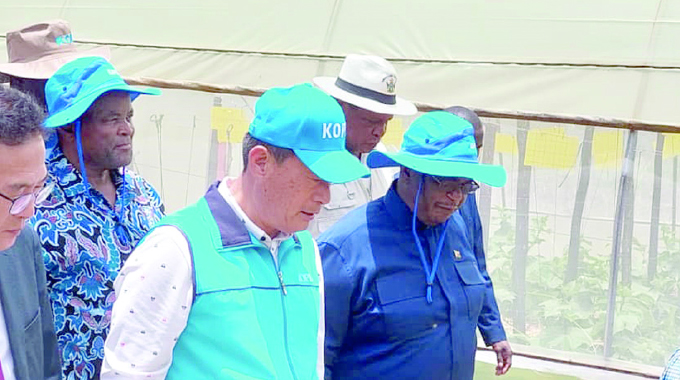Source: South Korean agricultural projects hailed | The Herald
Acting President Constantino Chiwenga tours a greenhouse of cucumber seedlings in Chishaka Village, Hwedza. The project is a result of a partnership between the Government of Zimbabwe and South Korea Victor Maphosa
Mashonaland East Bureau
Acting President Constantino Chiwenga has applauded South Korea for the agriculture and other developmental projects it is implementing in Zimbabwe to improve the living standards of people, particularly in rural areas.He made the remarks during his tour of the Korea Partnership for Innovation of Agriculture (KOPIA) projects in Chishaka Village, Hwedza District, yesterday. The tour will pave way for the funding of US$1,2 million from the South Korean government over a three-year period for the establishment of a model demonstration village in Hwedza, which will house a state-of-the-art hatchery and chick breeding facility, self-sufficiency feed manufacturing facility, agriculture leasing and repair facility and an academy to strengthen the competence of farmers.
Further, KOPIA will focus on the development of a pilot village to expand and grow drought tolerant maize for food self-sufficiency.
The project will target 18 882 households. Hwedza district was chosen for these projects because of its previous engagements with South Korea.
Already, some villagers in Hwedza are benefiting from the ongoing KOPIA projects, after getting free range chickens while others are involved in horticulture projects.
In implementing these projects, KOPIA has partnered with Zimbabwe’s Scientific and Industrial Research and Development Centre (SIRDC) which provides technical expertise.
Hwedza district successfully implemented the Korea Africa Food and Agriculture Cooperation Initiative (KAFACI) maize extension project, which left more than 600 households food secure.
The current KOPIA projects include horticulture and indigenous chickens, among other completed programmes.
Speaking after touring the KOPIA projects, Acting President Chiwenga said the programme resonated well with Zimbabwe’s vision of an upper middle income society by 2030.
“What we have witnessed today is in line with President E.D Mnangagwa’s mantra of leaving no one and no place behind,” he said. “International engagement and re-engagement, technology transfer and rural development, rank high on the Government’s development agenda, hence SIRDC’s partnership with KOPIA is extremely welcome.
“KOPIA contributes to the national priority area of the food and nutrition security of the National Development Strategy 1, an economic blueprint that steers Zimbabwe to realise this vision. Zimbabwe is eager to learn from Korea’s rapid development which was underpinned by the Korean Agriculture Revolution of the 1970s.”
Acting President Chiwenga said KOPIA comes at a time when more advanced research was needed to address challenges caused by climate change and its impact on agriculture and food security.
South Korean Ambassador to Zimbabwe, Do Bong Kai, said his government was prioritising agriculture cooperation with Zimbabwe and assisting to ensure food sustenance.
“Today we are witnessing how the agricultural cooperation projects between the Republic of Korea and the Republic of Zimbabwe bear fruits in the mountain village of Chishaka, the Hwedza district,” he said.
“For some years, the Korea Programme on International Agriculture (KOPIA) Zimbabwe centre has supported the Chishaka village with solar powered incubators, indigenous chickens, horticulture greenhouse and dug several solar powered boreholes for drinking and irrigation.
“Therefore, KOPIA initially surveyed and found that the erratic and unpredictable rainfalls do not allow some parts of Hwedza district to reap meaningful harvest. I have heard that many people are pleased with the transformation that the KOPIA project has brought to Chishaka village through creating jobs, boosting livelihoods and increasing household income.”
Ambassador Kai said NDS1, which indicated that the agricultural sector had potential to drive pro-poor economic growth and sustainable development, matched well with the Korean traditional philosophy that agriculture “is the prop of the country”.
“To the same effect, the Korean government has prioritised agricultural cooperation with Zimbabwe,” said Ambassador Kai.
He said since Zimbabwe had identified potato value chain as one of the key drivers to ensure food security, KOPIA Zimbabwe centre conducted a project to develop a disease-free potato seed through meristem culture and aeroponics technology in the SIRDC compound.
“The Korean government is very satisfied with the project that harvested almost 10 000 minitubers from the Aeroponics Greenhouse,” he said.
“My government is now considering how best to write another success story of agricultural cooperation, ngatibatanei pamwe mukurima (let’s unite in agriculture) between our two countries.”
A beneficiary of the programme, Mr Augustine Matiza, said: “When I joined the programme a few years back, I was given some indigenous chickens to raise and that was the beginning of my success story.
“Through the project, I managed to later buy a heifer and now I have three cattle from that. I want to thank our Government for allowing the Korean government to do this project in our village. Many people have had their lives transformed through this programme.”
Mr Matiza also benefited from solar powered incubators with capacity to hold over 120 eggs.

COMMENTS